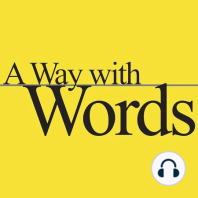5 min listen

Eastern Seaboard West Coast (rebroadcast) - 22 August 2011
FromA Way with Words - language, linguistics, and callers from all over
Eastern Seaboard West Coast (rebroadcast) - 22 August 2011
FromA Way with Words - language, linguistics, and callers from all over
ratings:
Length:
52 minutes
Released:
Aug 22, 2011
Format:
Podcast episode
Description
SUMMARYShadowdabbled. Moon-blanched. Augusttremulous. William Faulkner often used odd adjectives like these. But why? Grant and Martha discuss the poetic effects of compressed language. Also, African-American proverbs, classic children's books, pore vs. pour, and the double meaning of the word sanction.FULL DETAILSAmid the stacks of new titles at the library, Grant picks out The Wind in the Willows to read with his son. The hosts discuss the appeal of classic children's books. A bi-coastal listener wonders about the terms West Coast and Eastern Seaboard. Why don't we say Californians live on the Western Seaboard?Does an avid reader pore or pour over a book?There is always a person greater or lesser than yourself. Grant shares this and other African-American proverbs.Quiz Guy John Chaneski borrows a classic game from Joseph Shipley called Twin Ends. The expression that smarts, meaning "that hurts," dates back over a thousand years. Does sanction mean "a penalty" or "an approval"? Well, both. Martha explains the nature of contranyms, also known as Janus words. Here's an article about them in the periodical Verbatim.www.verbatimmag.com/27_2.pdfListeners share their suggestions for the game What Would You Serve? Hosting a golfer for dinner? Tea and greens should be lovely!William Faulkner used adjectives like shadowdabbled, Augusttremulous, and others that can only be described as, well, Faulknerian. Grant and Martha trade theories about why the great writer chose them. The University of Virginia has an online audio archive of Faulkner's during his tenure as that school's Writer-in-Residence.http://faulkner.lib.virginia.edu/Here's a 1956 interview with Faulkner about the art of writing. It ran in The Paris Review.http://www.theparisreview.org/interviews/4954/the-art-of-fiction-no-12-william-faulknerIn a previous episode, we wondered how U-turn might translate in different languages. One listener explains that in Hebrew, drivers make a horseshoe or a hoof-turn.The Century Dictionary contains a list of amended spellings from the late 1800s that only creates more of the confusion it set out to alleviate. Which is correct: We appreciate your asking or We appreciate you're asking? A new transplant to Dallas wants to assimilate into the Texan way of speaking without offending the locals or forcing any new vocabulary.Ever hear a broadcast where the announcer enunciates a little too precisely? Grant and Martha discuss the effect of softening syllables, such as "prolly" for "probably," and "wanna" for "want to."--A Way with Words is funded by its listeners: http://waywordradio.org/donateGet your language question answered on the air! Call or write with your questions at any time:Email: words@waywordradio.orgPhone: United States and Canada toll-free (877) WAY-WORD/(877) 929-9673London +44 20 7193 2113Mexico City +52 55 8421 9771Donate: http://waywordradio.org/donateSite: http://waywordradio.org/Podcast: http://waywordradio.org/podcast/Forums: http://waywordradio.org/discussion/Newsletter: http://waywordradio.org/newsletter/Twitter: http://twitter.com/wayword/Skype: skype://waywordradio Copyright 2011, Wayword LLC.
Released:
Aug 22, 2011
Format:
Podcast episode
Titles in the series (100)
The Secret Lives of Flowers (minicast) by A Way with Words - language, linguistics, and callers from all over